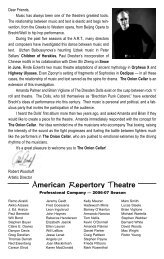CARMEN THE KEENING - American Repertory Theater
CARMEN THE KEENING - American Repertory Theater
CARMEN THE KEENING - American Repertory Theater
You also want an ePaper? Increase the reach of your titles
YUMPU automatically turns print PDFs into web optimized ePapers that Google loves.
Carmen is thin, a streak of black<br />
Circles round her gypsy eye.<br />
Her hair is dangerously black,<br />
Her skin, a devil burned it raw.<br />
The women say that she is ugly,<br />
The men are mad about her flesh:<br />
The archbishop of Toledo sings<br />
Upon devoted knees the mass.<br />
Her piquant, stinging ugliness<br />
Has a grain of that sea-salt<br />
From bitter seas where Venus rose<br />
Naked, with a sour smell.<br />
Gautier makes explicit what is only<br />
implicit in Mérimée: Carmen is a scruffy,<br />
sulky version of Venus herself.<br />
Carmen is also Latin for song, and she<br />
needed an opera to find her fullest expression.<br />
Recent critics have felt strongly<br />
Carmen’s irrepressible, uncircumscribable<br />
libido, her urgency of being. In her valuable<br />
handbook on Carmen, Susan<br />
McClary writes: “Carmen proves to be a<br />
difficult force to contain, however. The<br />
desire she inspires overwhelms the narrative.<br />
. . . The provocative eroticism of the<br />
‘Habañera’ makes it a kind of Pandora’s<br />
box.” But does Bizet’s music for Carmen<br />
actually spill out of every structure that<br />
might contain it? If we imagined a<br />
Carmen in which Don José sings a series<br />
of polite, tastefully passionate arias, each<br />
terminating in a neat cadence – in which<br />
Carmen declaims in a wildly sexy recitative,<br />
mocking every convention of melodic<br />
structure – then we would have a good<br />
musical equivalent of the politics of containment<br />
in gender and class. But this is<br />
the opposite of what Bizet did. From the<br />
point of view of musical formality, Carmen<br />
is the instinctive conformist, while Don<br />
José – whose music is full of asymmetrical<br />
phrases, uncertain harmonies, and crowddispleasing<br />
special effects – is the instinctive<br />
rebel.<br />
Why did Bizet confine Carmen to a<br />
repetitive, stanzaic discourse, to her<br />
parade of hit songs? Carl Dahlhaus<br />
thought that Bizet was illustrating the fact<br />
that Carmen “is incapable of attaining lyric<br />
urgency. Carmen can parody lyricism . . .<br />
but she cannot make it her own.” But<br />
Carmen’s songs don’t parody so much as<br />
quote lyricism: she isn’t improvising but<br />
performing a routine, quoting pre-existing<br />
songs. (In the case of the Habañera a literally<br />
pre-existing song, since Bizet borrowed<br />
the sinuously chromatic tune from<br />
an African-Cuban piece by Yradier.) The<br />
songs are scripted exercises in sexual<br />
compulsion – most sexy when most<br />
restrained by the bondage and discipline<br />
of stanzaic form. Carmen is Venus;<br />
Carmen is Song, and Don José (Speech)<br />
flutters half-helplessly in her wake.<br />
Daniel Albright is Ernest Bernbaum<br />
Professor of Literature at Harvard.<br />
<strong>CARMEN</strong> at a glance<br />
by Georges Bizet<br />
libretto by Henri Meilhac and Ludovic Halévy<br />
music adaptation by Bradley Greenwald<br />
directed by Dominique Serrand<br />
music director Barbara Brooks<br />
set design Dominique Serrand<br />
costume design Sonya Berlovitz<br />
lighting design Marcus Dilliard<br />
surtitles Steven Epp<br />
Production originally conceived by Christina Baldwin, Bradley Greenwald, Jennifer Baldwin Peden,<br />
and Dominique Serrand, and performed at Theatre de la Jeune Lune in the fall of 2003.<br />
CAST<br />
Carmen Christina Baldwin (mezzo-soprano)<br />
Don José Bradley Greenwald (baritone)<br />
Micaëla/Frasquita Jennifer Baldwin Peden (soprano)<br />
Escamillo/Soldier Bill Murray (baritone)<br />
Zuniga/The Guide Thomas Derrah<br />
Dancaire/soldier Justin Madel (tenor)<br />
Remendado/soldier Kelvin Chan (baritone)<br />
Mercedes/cigarette girl Corissa White (mezzo-soprano)<br />
Frasquita (Card Trio/Morceau)/cigarette girl Momoko Tanno (soprano)<br />
Pastia/cigarette girl Madeline Cieslak (soprano)<br />
Morales Dieter Bierbrauer (baritone)<br />
child Fred Metzger (soprano)<br />
CHORUS: Donna Bareket (mezzo-soprano), Neil Ferreira (tenor),<br />
Hayley Thompson-King (mezzo-soprano), Robert Shutter (baritone), Christine Teeters (soprano)<br />
Barbara Brooks (music director/piano), Kathy Kraulik (piano)<br />
SYNOPSIS<br />
As lovers pursue each other with the dangerous grace of toreadors, morality and desire clash. Betrothed to<br />
Micaëla, Don José falls passionately in love with Carmen, a gypsy who works at the local cigarette factory. Spurred<br />
on by his desire, Don José soon abets in Carmen’s escape from prison, deserts his army, and collaborates in the<br />
eponymous heroine’s smuggling operation in the mountains. Despite Don José’s sacrifices, Carmen begins to tire<br />
of her devoted but possessive lover and turns her attention to the bullfighter Escamillo. Don José begs Carmen to<br />
return to Seville with him, but she refuses. He responds with a final, violent act of passion.<br />
right: A caricature of Bizet from the<br />
cover of the magazine Diogène,<br />
September 1863.<br />
All other photos are from Theatre de la<br />
Jeune Lune’s production of Carmen<br />
below left: Jennifer Baldwin Peden,<br />
Christina Baldwin, and Bradley<br />
Greenwald.<br />
above: Christina Baldwin and Bradley<br />
Greenwald<br />
below right: The Habanera.<br />
photos by Michal Daniel<br />
ARTicles 3




![Wild Swans Program [pdf] - American Repertory Theater](https://img.yumpu.com/49339866/1/167x260/wild-swans-program-pdf-american-repertory-theater.jpg?quality=85)

![Press Release: Trojan Barbie [pdf] - American Repertory Theater](https://img.yumpu.com/47571290/1/190x245/press-release-trojan-barbie-pdf-american-repertory-theater.jpg?quality=85)
![Articles issue as 4_2 [pdf] - American Repertory Theater](https://img.yumpu.com/45053160/1/190x249/articles-issue-as-4-2-pdf-american-repertory-theater.jpg?quality=85)

![Three Pianos Program [pdf] - American Repertory Theater](https://img.yumpu.com/41616353/1/167x260/three-pianos-program-pdf-american-repertory-theater.jpg?quality=85)
![Three Sisters [pdf] - American Repertory Theater](https://img.yumpu.com/40969361/1/190x245/three-sisters-pdf-american-repertory-theater.jpg?quality=85)


![Program: Sleep No More [pdf] - American Repertory Theater](https://img.yumpu.com/24629394/1/167x260/program-sleep-no-more-pdf-american-repertory-theater.jpg?quality=85)
![Porgy and Bess Program [pdf] - American Repertory Theater](https://img.yumpu.com/24481101/1/167x260/porgy-and-bess-program-pdf-american-repertory-theater.jpg?quality=85)
![Program: Carmen [pdf] - American Repertory Theater](https://img.yumpu.com/24481072/1/190x245/program-carmen-pdf-american-repertory-theater.jpg?quality=85)
